外研版七年级(上)课文重点短语
七年级上英语外研知识点归纳总结
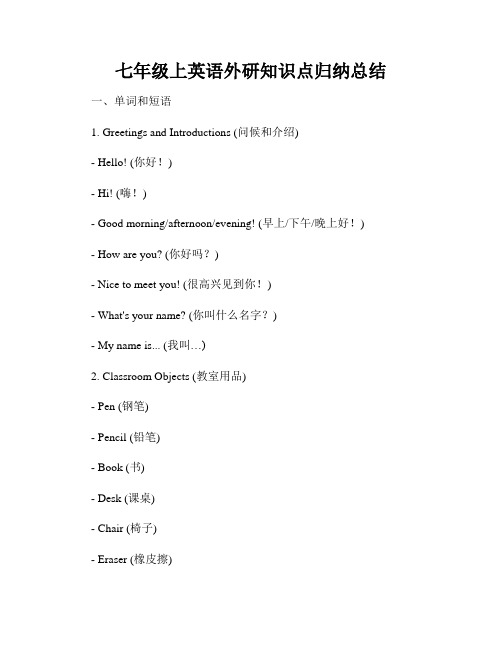
七年级上英语外研知识点归纳总结一、单词和短语1. Greetings and Introductions (问候和介绍)- Hello! (你好!)- Hi! (嗨!)- Good morning/afternoon/evening! (早上/下午/晚上好!)- How are you? (你好吗?)- Nice to meet you! (很高兴见到你!)- What's your name? (你叫什么名字?)- My name is... (我叫…)2. Classroom Objects (教室用品)- Pen (钢笔)- Pencil (铅笔)- Book (书)- Desk (课桌)- Chair (椅子)- Eraser (橡皮擦)- Ruler (尺子)- Bag (书包)3. Numbers (数字)- Zero (零)- One (一)- Two (二)- Three (三)- Four (四)- Five (五)- Six (六)- Seven (七)- Eight (八)- Nine (九)- Ten (十)4. Days of the Week (星期) - Monday (星期一)- Tuesday (星期二)- Wednesday (星期三)- Thursday (星期四)- Friday (星期五)- Saturday (星期六)- Sunday (星期日)5. Family Members (家庭成员) - Mother (妈妈)- Father (爸爸)- Brother (哥哥/弟弟)- Sister (姐姐/妹妹)6. Colors (颜色)- Red (红色)- Blue (蓝色)- Yellow (黄色)- Green (绿色)- Orange (橙色)- Purple (紫色)- Black (黑色)- White (白色)二、语法知识点1. 一般现在时- 表示经常性或习惯性的动作或状态。
Starter 课文知识讲解(重点短语 句子解析)2024-2025学年新外研版英语七年级上册

外研版七年级上册新教材(讲义)Starter Welcome to junior high !重点短语Welcome to junior high! - 欢迎来到初中!a new stage of your study - 你学习的新阶段go to a new school - 前往一所新学校learn new subjects - 学习新科目make new friends - 结交新朋友Are you ready for all these? - 你为这一切准备好了吗?in this unit - 在这个单元中let's get prepared - 让我们做好准备it will be fun - 这将会很有趣Junior high school - 初中Pack your schoolbag - 收拾你的书包Pencil case - 铅笔盒Two pencils, three pens, an eraser, and a ruler - 两支铅笔,三支钢笔,一块橡皮和一把尺子Textbooks - 教科书Building 2 - 2号楼on the first floor - 在一楼science and computer labs - 科学和计算机实验室on the second floor - 在二楼Music rooms - 音乐室art rooms - 美术室a dance hall - 舞厅there's also a library - 还有一个图书馆it's on the third floor - 它在三楼showed me around - 带我参观I really like it - 我真的很喜欢它I love sports very much - 我非常喜欢运动This summer holiday - 这个暑假went to Dalian with my parents - 和我的父母去了大连swam in the sea - 在海里游泳played on the beach - 在沙滩上玩耍I enjoyed it a lot - 我非常喜欢a helpful girl - 一个乐于助人的女孩helping people with their difficulties - 帮助别人解决困难a bit nervous - 有点紧张excited to meet new teachers and classmates - 很兴奋能够遇见新的老师和同学家成为朋友make friends with you all - 和大课文句子详解原文This is Building 2. On the first floor,-we have science and computer labs. Music rooms, art rooms and a dance hall are on the second floor. And there's also a library. It's on the third floor.This is our playground. We do morning exercises and hold school sports events here. After school,we run or play football in it. It's my favourite place in school.This is our dining hall.It's not big, but the food is delicious and healthy.句子详解This is Building 2.句型:主语 + 系动词 + 宾语时态:一般现在时短语:Building 2 (2号楼)考点:This is...句型;对某物做出陈述或描述。
七年级英语上册(外研版)素材 Module.1 模块整体分析
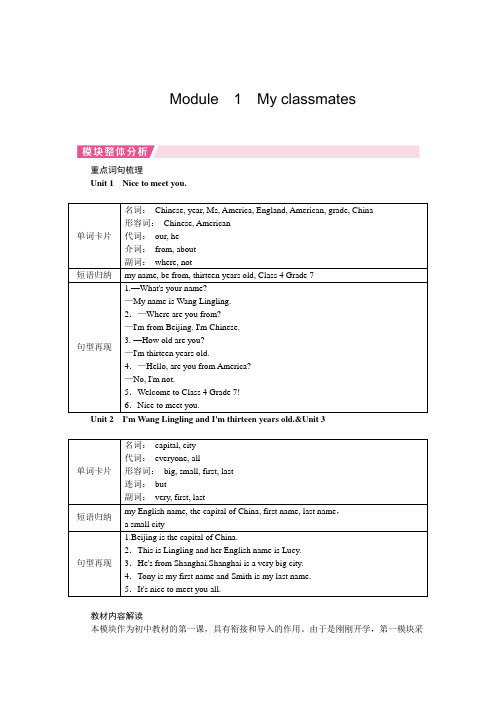
Module 1My classmates重点词句梳理Unit 1Nice to meet you.单词卡片名词:Chinese, year, Ms, America, England, American, grade, China 形容词:Chinese, American代词:our, he介词:from, about副词:where, not短语归纳my name, be from, thirteen years old, Class 4 Grade 7句型再现1.—What's your name?—My name is Wang Lingling. 2.—Where are you from?—I'm from Beijing. I'm Chinese. 3. —How old are you?—I'm thirteen years old. 4.—Hello, are you from America? —No, I'm not.5.Welcome to Class 4 Grade 7! 6.Nice to meet you.Unit 2I'm Wang Lingling and I'm thirteen years old.&Unit 3单词卡片名词:capital, city代词:everyone, all形容词:big, small, first, last 连词:but副词:very, first, last短语归纳my English name, the capital of China, first name, last name,a small city句型再现1.Beijing is the capital of China.2.This is Lingling and her English name is Lucy. 3.He's from Shanghai.Shanghai is a very big city. 4.Tony is my first name and Smith is my last name. 5.It's nice to meet you all.教材内容解读本模块作为初中教材的第一课,具有衔接和导入的作用。
外研版英语七年级上课文背诵中文提示

Module 1(一般现在时be;人称代词;形物代)Ms Li:您好。
我的名字是李芳。
我是你们的老师,你们是我的学生。
我是中国人。
我来自武汉。
你叫什么名字?Lingling:我的名字是王玲玲。
Ms Li:见到你很高兴,玲玲。
你来自于哪里?Lingling:我来自于北京,我是中国人。
Ms Li:你多大了?Lingling:我13岁了。
Ms Li:好。
您好,你呢?Daming:您好。
李老师。
我的名字是李大明,我也来自于北京。
我12岁。
Ms Li:谢谢。
您好!你来自于美国吗?Tony:不,我不是。
我来自于英国。
我是托尼·史密斯Ms Li:见到你很高兴,托尼。
嗨,你也是英国人吗?Betty:不,我不是。
我是美国人,我的名字是贝蒂·金。
Lingling:托尼和贝蒂是我们的朋友。
Ms Li:好,欢迎来到7年级4班。
(指示代词;名词所有格)Lingling:这是你的家人吗?Tony:是的,它是。
Lingling:好大一家子啊!这是你的姐姐吗?Tony:是的,它是。
她的名字叫琳达。
Lingling:这些是你的祖父母吗?Tony:是的,它们是。
我母亲的父母在左边,我父亲的父母在右边。
Lingling:我明白了。
这是谁?Tony:那是我爸爸。
Lingling:这是你的妈妈吗?Tony:是的。
在我妈妈旁边的女人是我爸爸的姐姐,我的姑姑利兹。
Lingling:这是她的丈夫吗?Tony:不,那是她的弟弟,我的叔叔保罗。
Lingling:保罗前面的男孩和女孩是谁?Tony:那些是保罗的儿子和女儿,我的堂兄妹,麦克和海伦。
(How many…?; there be句型;方位介词)Daming:琳达,英国的教室是怎么样的?它大吗?Linda:是的,它很大。
我班有30个学生。
在北京,你的班里有多少学生?Daming:有40名学生,20名女生,20名男生。
你班里都有什么?有很多家具吗?Linda:是的,有。
Daming:每个人的书桌上都有电脑吗?Linda:不,没有。
Unit 3 Family ties --课文知识讲解(重点短语+句子解析)

外研版七年级上册新教材(讲义)Unit 3 Family ties重点短语the meaning of family 家庭的意义communicate with 与…联系each other 互相by the end of 到…为止make a photo album 制作相册be able to 能talk about 讨论family moment 家庭时刻each person 每个人stand for 代表on the right 在右边answer the question 回答问题an older man 年长的男人a strict face 严肃的面孔a touching story 一个感人的故事be absent from 缺席take over 接管along the way 随着时间的推移turn to 向…求助in order to do 为了做solve problems 解题Chinese saying 汉语语句give advice 劝告advise - advice (不可数) 建议v.-建议n.(不可数)suggest - suggestion(s)建议v.-建议n. (s) family relationship 家庭关系dress up 打扮the school ride bike 学校骑自行车be close to 接近a serious disease 严重的疾病not....at all 根本没有...have to 不得不has to 不得不at home 在家every day 每天start to do 开始做某事across the cold river 穿过冰冷的河流run down 撞倒grow - growth 生长生长give sth. to sb. 给某人某物look for 寻找Actions speak louder than words.事实胜于雄辩。
Unit 1 A new start --课文知识讲解(重点短语+句子解析)

外研版七年级上册新教材(讲义)Unit 1 A new start重点短语on the blackboard 在黑板上write down 记下start to do 开始做the first 第一个point out 指出...in the first lesson 在第一节课jump into my mind 跳进我的脑海look up at 抬头看think about 思考,想想看put up my hand 举起手来There is a mistake. 有一个错误。
Confucius 孔子Mencius 孟子well done 做得不错in fact 事实上all of you 你们所有人junior high school 初中more difficult 难度更大It’s important to do做某事这是很重要的the main idea of the passage 该文章的中心思想learn from 向…学习make mistakes 犯错it’s important for sb. to do sth. 某人做事很重要。
come into 进入ask sb. to do sth 要求某人做些什么how about …怎么样fell so nervous 非常紧张地gave a silly answer 给出了一个愚蠢的答案turn red 变红with a smile 微笑着(脸上带着)make sb.+ adj. 让某人怎么样了the students' union 学生联合会at school 在学校all kinds of activities 各种活动such as 比如cultural festivals 文化节日sports meets 体育比赛sometimes 有时need to 需要describe our problems 描述我们的问题state our problems 说明我们的问题for example 例如It's hard to do sth. 这是很困难的去做......give sb. some advice 给某人一些建议the first 最先a piece of advice 一条建议the second 第二个look at 看look up 向上看/ 查阅(字典)by yourself 单独地、靠你自己problem 问题try your best 尽你所能work hard 努力工作read the passage 标题的含义find out 发现the meaning of the title 读这篇文章Do you remember...? 你还记得......吗?your sixth birthday 你的六岁生日made a paper boat 做了一艘纸船in the pool 在池中sail away 远航look at 查看It's a letter from sb. 这是某人的一封信。
Unit 2 More than fun --课文知识讲解(重点短语+句子解析)

外研版七年级上册新教材(讲义)Unit 2 More than fun重点短语need to do 需要做…search online 在线搜索plant flowers 种花ride a bike 骑自行车play the violin 拉小提琴on the right 在右边rock music 摇滚乐come out of 由…产生,从…出来as 作为play the electric guitar 弹电吉他write songs 写歌right at this moment 就在这时the sound of erhu 二胡的声音play the erhu 弹二胡why don’t + 人+do 为什么不...?why not+ do 为什么不....呢?rush into his room 冲进他的房间an art festival 一个艺术节decide to do sth. 决定做某事take part in参与a week’s practice一周的练习on the stage 在舞台上fire up 点燃give me a big smile 给我一个大大的微笑smile back 微笑回来main idea of the passage 该文章的主要思想have great fun 玩得很开心an idea suddenly hits me 我突然想到了一个想法write about 写…的事for a long time 长久first prize 一等奖Beijing opera competition 京剧赛until+从句 until+从句from then on 从时起start to do sth. 开始做某事。
paper-cutting 切纸a few 少许few 少数a little 少量地little 少量的hundreds of 好几百the same 一样with social media 通过社交媒体share the fun online 在网上分享乐趣in nature 在世界上bird-watchers 鸟观察者more and more... 越来越...be awake 醒着的at midnight 在午夜walk over 穿过tap on the door 轻敲门shake head 摇头shake hands 握手feel a bit lonely 感到有点孤独like doing 喜爱做某事magic stories 魔法故事want to do sth 想要做某事make friends 交朋友look around 四下观望share the joy of writing 分享写作的乐趣an idea hit her 她灵机一动on a shelf 放在架子上a week later 一星期后how about + doing .....怎么样?a writing group 一个写作小组let’s让我们after lunch 午饭后课文句子详解原文Rock music meets the erhuRock music is coming out of my computer. As a rock music lover, I play the electric guitar in the school band. Sometimes I write songs and share them online. There is so much fun in music.Right at this moment, the sound of Grandpa's erhu cuts in. Yes, music is also my grandpa's hobby. But it's a different kind of music. He likes playing the erhu in the park with his friends. They sing Beijing opera together. There are many fans of them.An idea suddenly hits me: “Why don't we put our music together? I can write a song for us.""Grandpa!" I rush into his room...There is an art festival every autumn in my school. I decide to.take part in it with Grandpa this year. After a week's practice, we are on the stage. I nod to Grandpa and we fire up our instruments. Everybody moves with our music.Grandpa gives me a big smile, and I smile back. It feels great to enjoy our hobby together.句子详解Rock music is coming out of my computer.句型: 主语+ 谓语+ 副词短语时态: 现在进行时短语: Rock music (摇滚音乐), coming out of(从)my computer (我的电脑)用法: 描述正在发生的动作举例: Water is dripping from the faucet. (水正从水龙头滴下来。
七年级英语上册 Module 4 Healthy food词句精讲精练 (新版)外研版

Module 4 Healthy food词句精讲精练词汇精讲1. foodfood泛指“食物”,“食品”,通常用做不可数名词。
例如:I like Chinese food. 我喜欢中国食品。
We should eat healthy food every day. 我们每天应该吃健康食品。
food指食物的种类时是可数名词。
例如:Milk is a good food. 牛奶是一种好食品。
Too many sweet foods, like cakes and pastry, may make you fat. 太多的甜食,像蛋糕和点心,可能会使你发胖。
2. fruitfruit 名词,“水果”。
当表示水果的总称时,是不可数名词;当强调不同种类的水果时,是可数名词。
例如:Do you like fruit? 你喜欢水果吗?Which kind of fruit do you like? 你喜欢哪一种水果。
3. chickenchicken名词,意为“鸡肉,小鸡”。
表示“鸡肉”时为不可数名词;表示“小鸡”时则为可数名词,其复数形式是chickens。
如:Chicken is healthy food. I like eating it. 鸡肉是健康食品,我喜欢吃。
We can see some chickens on the farm. 在农场上我们可以看见一些小鸡。
4. kindkind 作名词时,意为“种类”;a kind of 意为“一种”;all kinds of 意为“各种各样的”。
都表示种类,用来修饰名词。
例如:This is a kind of bird. 这是一种鸟。
There are all kinds of birds in the tree. 树上有各种各样的鸟。
5. lots oflots of的意思是“大量的、许多的”,和a lot of是同义词短语。
lots of既可以修饰可数名词的复数形式,相当于many;也可以修饰不可数名词,相当于much。
2013外研版英语七年级上册 M2 U1 (课文)

固定短语
play the + 乐器
Learning aims:
1、掌握本课的单词,短语以及重要句子。 sing dance ride cook piano / violin term club join worry play the piano / violin play the + 乐器 play table tennis / basketball / football play + 球类 ride a bike speak Japanese / Chinese / English speak + 语言 on the board I’d like = I would like worry about
So choose you favourite club.
Play basketball 打篮球 football 踢足球 cards 玩牌 chess 下棋
Play the piano Play the guitar Play the violin
play和乐器类搭配时,要用 冠词 the.
cook
Deal with the dialogue
• Read the dialogue silently and fill in the blanks in Activity 3. • Work in groups to check the answers. • Complete the passage in Activity 4.
I’d like 4. _____ ______ (我想要) to buy a new computer. that’s all 5. I can cook eggs , but ______ ______(仅此而已). join 6. --- I want to ____(加入) the English Club.
外研版英语七年级上册辅导讲义Unit 8 Collecting things
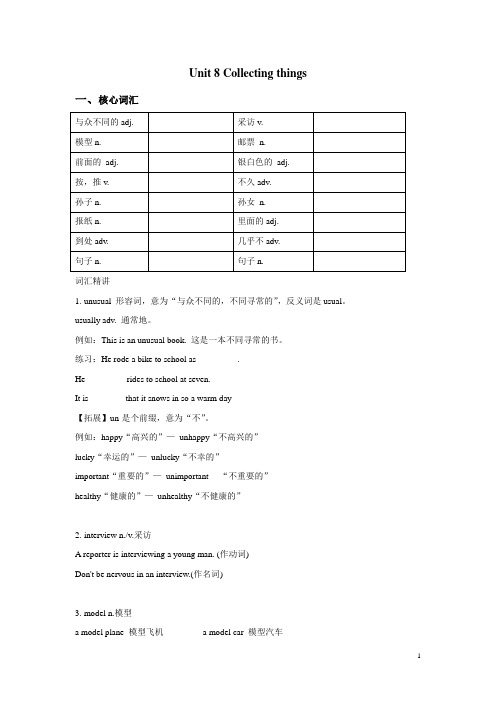
Unit 8 Collecting things一、核心词汇与众不同的adj. 采访v.模型n. 邮票n.前面的adj. 银白色的adj.按,推v. 不久adv.孙子n. 孙女n.报纸n. 里面的adj.到处adv. 几乎不adv.句子n. 句子n.词汇精讲1.unusual 形容词,意为“与众不同的,不同寻常的”,反义词是usual。
usually adv. 通常地。
例如:This is an unusual book. 这是一本不同寻常的书。
练习:He rode a bike to school as _________.He _________rides to school at seven.It is ________that it snows in so a warm day【拓展】un-是个前缀,意为“不”。
例如:happy“高兴的”—unhappy“不高兴的”lucky“幸运的”—unlucky“不幸的”important“重要的”—unimportant“不重要的”healthy“健康的”—unhealthy“不健康的”2.interview n./v.采访A reporter is interviewing a young man. (作动词)Don't be nervous in an interview.(作名词)3.model n.模型a model plane 模型飞机 a model car 模型汽车a model ship 模型船 a model house 模型房子4. stamp n.邮票a collection of stamps 邮票收藏 收藏邮票 collect stampsa stamp show/exhibition 邮票展5. doorbell 名词,意为“门铃”,是个合成词,由“door+bell ”构成。
合成词是一种重要的构词法,对我们记忆单词很有帮助。
外研版英语七年级上册Module 2 Unit1 课文重难点(复习课件,附练习)

What a fine day it is!
family, home和house 1) family意为“家,家庭,家人”,着重
指由家庭成员组成的社会基本结构— —家庭或家庭中的每个成员,如: I love my family. 我爱我家。
next to是介词短语,意思是“紧挨着, 紧靠着”,这里的next to her用来修饰 the woman。
Tom lives next to Daniel. 汤姆住在丹尼尔隔壁。
4. What a big family! 真是一个大家庭 啊!
这是一个省略了的感叹句,完整的形式 是 What a big family it is! 基本句型结构:What + a(an) + (形容词
Words and expressions
woman n. 成年女子,妇女 next adj. 紧挨着,紧靠着 adv. 紧接下来地,下一步
next to 在……旁边,紧挨着 husband n. 丈夫
front n. 前面,正面 in front of 在……的前面
those pron. 那些
1. Is this your family? 这是你的家人吗?
—Yes, he is. 4. Mrs Chen’s _h_u_s_b_a_n_d_ (丈夫) is very
tall.
5. The boy is my English teacher’s ___s_o_n___ (儿子).
— Yes, it is. / No, it isn’t. 5. — Are these …?
—Yes, they are. / No, they aren’t.
外研版七年级上册Module7 知识点+习题(含答案)

第7讲Computers学习目标一、熟练掌握重点单词、词组的用法;二、熟练掌握一般现在时的特殊疑问句的用法;三、会做对划线部分提问;四、对句型变化掌握更加熟练;五、理解并运用关于电脑的介绍。
知识串烧单词1、keyboard ['ki:,bɔ:d] 键盘2、mouse [maʊs] 鼠标;老鼠3、screen [skri:n] 屏幕4、connect [kə'nekt] 连接5、turn [tɜːn] 转动6、turn on 打开7、learn [lɜːn] 学;学习8、document ['dɒkjʊmənt] 文件9、click [klɪk] 点击10、use [juːz] 使用11、save [seɪv] 保存;储存12、box [bɒks] 框;盒子13、finally ['faɪnəlɪ] 最后14、print [prɪnt] 打印15、paper ['peɪpə] 纸16、share [ʃeə] 共用、分享17、Australia [ɒs'treɪlɪə] 澳大利亚18、company ['kʌmpənɪ] 公司;剧团19、often ['ɒfən] 经常20、customer ['kʌstəmə] 顾客21、internet ['ɪntənet] 因特网22、check [tʃek] 检查、查看23、train [treɪn] 火车24、travel ['trævl] 旅行25、plan [plæn] n.计划26、v.计划;打算27、ticket ['tɪkɪt] 票28、music ['mjuːzɪk] 音乐29、movie ['muːvɪ] 电影30、night [naɪt] 夜晚31、search [sɜːtʃ] 搜寻;搜索;查找32、information [ɪnfə'meɪʃn] 信息33、email ['iːmeɪl] 电子邮件34、send [send] 发送35、game [geɪm] 游戏36、sometimes ['sʌmtaɪmz] 有时候;不时37、cinema ['sɪnɪmə] 电影院38、clothes [kləʊðz] 衣服(总称)39、visit ['vɪzɪt] 探望;参观40、holiday ['hɒlɪdeɪ] 假日;节日课文U1 How do I write my homework on the computer? Linging: How do I write my homework on the computer? Can I learn?Betty: Sure! First, open a new document. Click the mouse on "new document". Linging: What's the mouse? Is this it?Betty: Yes.Linging: Where do I click on "new document"?Betty: On the left of the screen... there!Linging: OK, what's next?Betty: Next, you write your homework in the new document. Use the keyboard.Linging: What do I do next? How do I save the document?Betty: You click "save", and write a name for it.Linging: Where do I write the name?Betty: Write it in the box. OK, then click "save" again.Linging: OK. Finally, how do I print my document?Betty: Click "print" and "OK".Linging: What about some paper?Betty: Oh yes, of course! You put the paper in there first!U2 When do you use a computer?There is a computer in my home, and my father and I shares it. My father is a manager of a company, so he often talks to his customers on the computer. He also goes on the Internet to check the times of trains, make travel plans, and buy tickets. I listen to music or watch movies on it every Friday night. – JackThere is no computer in my home. I can only use it at school. On the Internet, I search for information, do my homework and check my email. I have a friend in Australia.I can see her and talk to her on the Internet. – AliceWe have a computer at home. My parents don't use it. I can use it on Sundays. I send email to my friends and play computer games. But sometimes I play a lot of games and my mother doesn't like it. -- Mike语法一、一般现在时的特殊疑问句A.定义:以特殊疑问词开头,对句中某一成分提问的句子叫特殊疑问句。
外研版英语七年级上册 Module 4 知识点+习题
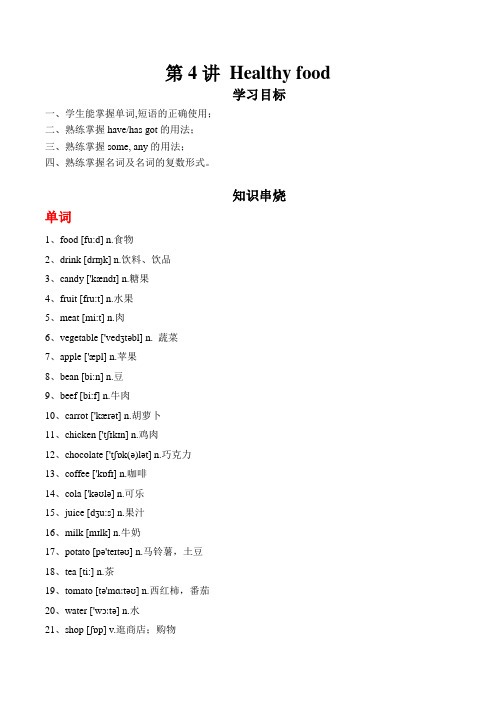
第4讲Healthy food学习目标一、学生能掌握单词,短语的正确使用;二、熟练掌握have/has got的用法;三、熟练掌握some, any的用法;四、熟练掌握名词及名词的复数形式。
知识串烧单词1、food [fu:d] n.食物2、drink [drɪŋk] n.饮料、饮品3、candy ['kændɪ] n.糖果4、fruit [fru:t] n.水果5、meat [mi:t] n.肉6、vegetable ['vedʒtəbl] n. 蔬菜7、apple ['æpl] n.苹果8、bean [bi:n] n.豆9、beef [bi:f] n.牛肉10、carrot ['kærət] n.胡萝卜11、chicken ['tʃɪkɪn] n.鸡肉12、chocolate ['tʃɒk(ə)lət] n.巧克力13、coffee ['kɒfɪ] n.咖啡14、cola ['kəʊlə] n.可乐15、juice [dʒu:s] n.果汁16、milk [mɪlk] n.牛奶17、potato [pə'teɪtəʊ] n.马铃薯,土豆18、tea [ti:] n.茶19、tomato [tə'mɑːtəʊ] n.西红柿,番茄20、water ['wɔːtə] n.水21、shop [ʃɒp] v.逛商店;购物22、go shopping 去买东西,去购物23、have [hæv] v. aux(助动词)有;吃,喝24、get [get] v.得到25、have got 有;拥有26、some [sʌm; s(ə)m] adj.若干,一些;少量的一些,某些27、much [mʌtʃ] adj.许多的,大量的28、too much 太多29、kind [kaɪnd] n.种类30、lots of 大量;许多31、so [səʊ] conj.因此;所以32、how about (征求意见)…好么?…行吗?33、has [hæz] (have的第三人称单数现在式)34、bad [bæd] adj.坏的;不好的35、healthy ['helθɪ] adj.健康的36、delicious [dɪ'lɪʃəs] adj.美味的37、bread [bred] n.面包38、fish [fɪʃ] n.鱼肉;鱼39、hamburger ['hæmbɜːgə] n.汉堡包40、ice cream [,aɪs'kri:m] n.冰激凌41、noodle ['nuːd(ə)l] n.面条42、rice [raɪs] n.米;米饭43、sugar ['ʃʊgə] n.糖44、children ['tʃɪldrən] n.(14岁以下的)小孩,儿童45、be good for 对…有帮助46、sweet [swiːt] adj.甜的47、be bad for 对…有害的48、right [raɪt] adj.正确的,对的49、egg [eg] n.蛋,鸡蛋50、eye [aɪ] n.眼睛51、cheese [tʃi:z] n.奶酪52、tooth [tu:θ](pl. teeth[ti:θ])n.牙齿53、bit [bɪt] n.一点;少许54、a bit 稍微;有点儿55、tired [taɪəd] adj.劳累的56、soup [su:p] n.汤57、important [ɪm'pɔːt(ə)nt] adj.重要的58、remember [rɪ'membə] v.记住;记起59、well [wel] adv.好地60、stay [steɪ] v.保持;停留61、fat [fæt] adj.肥胖的62、get fat 发胖63、or [ɔː] conj.或者64、breakfast ['brekfəst] n.早饭65、lunch [lʌntʃ] n.午饭66、home [həʊm] n.家;家庭67、dinner ['dɪnə] n.晚饭;正餐68、banana [bə'nɑːnə] n.香蕉69、buy [baɪ] v.买课文U1 We've got lots of apples.Tony’s dad: Tony, let's go shopping for food and drink. Now, we haven't got any meat. Let's get some chicken.Tony: OK. Have we got any chocolate?Tony’s dad: Yes, we have. Too much chocolate isn't good for you. Let's get some fruit.Tony: What kind of fruit? Apples?Tony’s dad: No, we've got lots of apples. We haven't got any oranges, so let's get some.Tony: OK. How about some orange juice?Tony’s dad: Yes, good idea! And coffee. Let's get some for your mum. She hasn't got any coffee. Tony: All right, some coffee for Mum, and some cola for me. I haven't got any cola.Tony’s dad: No cola! Cola is bad for you! How about some tea?Tony: Oh, too bad!U2 Is your food and drink healthy?Healthy food and drink for childrenIs your food and drink healthy? A lot of ice cream, hamburgers and cola is not healthy. Meat is healthy but too much meat is not good for children. Cola and candy are very sweet, and too much sugar is bad for you.Eat the right food and be healthy. Carrots, eggs and sweet potatoes are good for your eyes. Milk, cheese and fish are good for your teeth. A bit tired? Have lots of delicious chicken soup! It is important to remember: eat well, stay healthy, and don't get fat!·Eat noodles or rice, not hamburgers.·Have a good breakfast every morning.·Drink juice, water and milk, not cola.·Eat lots of fruit and vegetables.语法一、have/has got 的用法1. have got意为“有;拥有”,如果想表达某人拥有某物,可用句型“主语+have/has got+其他”,其中have有人称和数的变化,当句子主语为第三人称单数或单数名词时,用has got。
外研版七年级英语上语法知识点汇总

外研版七年级英语上册语法知识点汇总一,肯定的祈使句祈使句用来表示请求、命令、叮嘱、邀请、劝告或祝愿等,通常省略主语,直接用动词原形开头,句尾用句号或感叹号。
常用句型是:肯定句用“动词原形+……”,否定句用“Don't + 动词原形+……”。
有时,在祈使句前面或末尾加上please,显得有礼貌。
例:Come in, please! 请进!)Don't open your book!不要打开书。
以Let开头的祈使句的肯定句和否定句。
Let him not speak! 让他不要讲话!Don’t let him speak!不要让他讲话!二,基数词的表达三,what引导的特殊疑问句疑问词what引导的特殊疑问句,询问事物内容或者人的职业。
此类疑问句可以对主语、表语和宾语提问。
?1. 对主语提问例:What is in your pocket?你口袋里有什么?这个问题可以有两种回答:a:There is an egg in it. 在口袋里有一个蛋。
b:An egg (is in it). 一个蛋(在里面)。
-What are there in the room? 屋子里有什么?-There are a lot of chairs in it. 里面有许多椅子。
|注意:回答此句型的问题时,答句的单复数根据实际情况而定。
2. 对宾语提问例:-What did you buy?-你买了什么?-I bought a bike.-我买了辆自行车。
3. 对表语提问例:-What is this?-这是什么?,-It's a bench. -这是一条长凳。
-What is your mother?-你妈妈是干什么的?-She is a teacher. 她是一名老师。
注意:What is+人? 此句型询问人的职业。
还可用What is sb's job?或者What does/do sb. do? 询问人的职业。
外研版英语七上Module3重要单词语法点总结
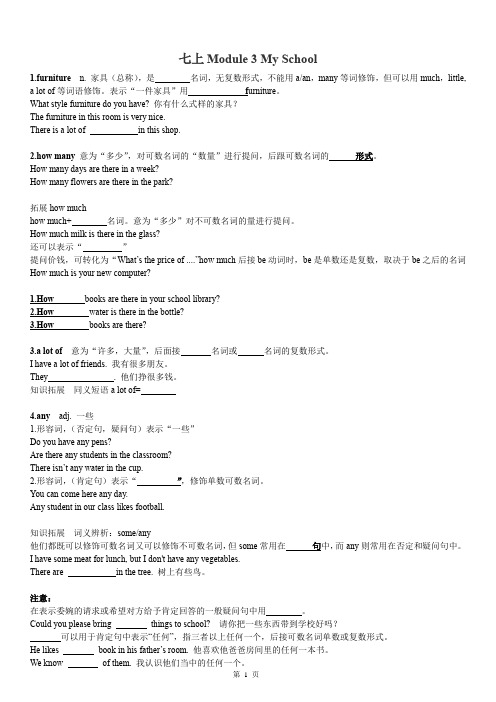
七上Module 3 My School1.furniture n. 家具(总称),是名词,无复数形式,不能用a/an,many等词修饰,但可以用much,little,a lot of等词语修饰。
表示“一件家具”用f urniture。
What style furniture do you have? 你有什么式样的家具?The furniture in this room is very nice.There is a lot of in this shop.2.how many 意为“多少”,对可数名词的“数量”进行提问,后跟可数名词的形式。
How many days are there in a week?How many flowers are there in the park?拓展how muchhow much+名词。
意为“多少”对不可数名词的量进行提问。
How much milk is there in the glass?还可以表示“”提问价钱,可转化为“What’s the price of ....”how much后接be动词时,be是单数还是复数,取决于be之后的名词How much is your new computer?1.How books are there in your school library?2.How water is there in the bottle?3.How books are there?3.a lot of 意为“许多,大量”,后面接名词或名词的复数形式。
I have a lot of friends. 我有很多朋友。
They. 他们挣很多钱。
知识拓展---同义短语a lot of=4.any adj. 一些1.形容词,(否定句,疑问句)表示“一些”Do you have any pens?Are there any students in the classroom?There isn’t any water in the cup.2.形容词,(肯定句)表示“”,修饰单数可数名词。
七年级上册英语外研版重点句子

七年级上册英语外研版重点句子以下是七年级上册英语外研版的一些重点句子:1、-What's your name? -My name's ...(询问别人叫什么名字)2、-How are you? -I'm fine./I'm OK.(问候别人)3、-Nice to meet you. -Nice to meet you, too.(遇见认识的人)4、-Where are you from? -I'm from ...(询问别人来自哪里)5、-What's your favorite subject? -My favorite subject is ...(询问别人最喜欢的科目)6、-What's your favorite color? -My favorite color is ...(询问别人最喜欢的颜色)7、-What's your favorite food? -My favorite food is ...(询问别人最喜欢的食物)8、-Can you speak English? -Yes, I can./No, I can't.(询问别人是否会讲英语)9、-What day is it today? -It's ...(询问今天是星期几)10、-What's the date today? -It's ...(询问今天是几号)11、-How much is it? -It's ... yuan.(询问物品价格)12、-What time is it? -It's ... o'clock.(询问现在几点)13、-What day is it? -It's ... day.(询问今天是星期几)14、-How are you doing?(问候别人近况)15、-Please sit down./Have a seat.(请别人坐下)16、-Thank you./Thanks a lot.(感谢别人)17、-You are welcome./Not at all.(回答别人的感谢)18、-What day is it today? -It's Monday./It's a sunny day.等等。
新外研版七年级上英语M4-语法课

Moudul 4 Healthy food 课型:前置语法课【学习目标】1朗读本课所学的新单词。
2、 区分 some, any 的用法。
3、 区分可数名词和不可数名词,掌握可数名词和不可数名词的正确用法。
4、 继续巩固have/has got 的用法。
【课前准备】1读出下列单词,并能与实物或图片相匹配: apple beef carrot chichen juice melon milk Coke hamburger onion orange pork potato tomato water noodle candy ice cream 2、翻译短语或句子:(1) _________________________ 、six apples ____________________________ twotomatoes ____________________a carrot _____________ an onion ____________ some bananas ________(2) 、They have got some milk.(3) 、They haven ' t garty melons.(4) 、一 Have we got any meat in the fridge? — No, we haven ' any meat.(5) 、We have got someoranges and someapples.观察思考:可数和不可数名词: _________________________________ _____________ Have got 在肯定句、否定句和一般疑问句中的用法:Some any 的用法: _____________________________________________________________回顾:我们还学过哪些表示事物名称的词?它们有复数形式吗?请写出来:3、精讲规则:A. 名词通常分为可数名词和不可数名词,不可数名词没有复数形式;可数名词表示单 个事物时, 前面通常加some water ___________ some rice ______________ ten potatoes ___________不定冠词 a 或an, 表示两个或两个以上的数量时,通常用复数形式。
Unit 4 Time to celebrate --课文知识讲解(重点短语+句子解析)

外研版七年级上册新教材(讲义)Unit 4 Time to celebrate重点短语Spring Festival 春节family reunion 家庭团聚in the UK 在英国treat my British friend 对待我的英国朋友a Chinese dinner 一顿中国晚餐cook sth for sb 为某人做饭in China 在中国whole family 家庭成员on the phone 在打电话a chef 厨师in one hour 在一个小时内some cucumber flowers 一些黄瓜花the dining hall 餐厅the last dish 最后一道菜on the table 在桌子上the lion’s head狮子的头against the law 违法be shocked 吃惊a pork meatball 猪肉丸stand for 代表a piece of 一块around the world 世界各地Chinese culture 中国文化the Dragon Boat Festival 端午节the Double Fifth Festival 双五节in English 用英语on the fifth day of the fifth lunar month 农历五日五日the dragon boat races 龙艇比赛eat zongzi 吃粽子in the north of China 在中国的北部you prefer 你更喜欢a traditional festival 传统节日in the west 在西方a Christmas tree 圣诞树a large meal 一顿大餐give each other presents 互相赠送礼课文句子讲解原文An unusual Spring FestivalIt was my first Spring Festival in the UK.I wanted to treat my British friend, Emilia, to a Chinese dinner. She is a nice girl. Sometimes, she cooks for me.However, I just couldn't make it. I often watched Grandma cook, but I never cooked anything myself. It was midnight in China, time for dumplings. But my whole family came to my help on the phone. And I became a chef in one hour! I even made some cucumber flowers.After Emilia hung balloons and lanterns in the dining room, I put the last dish on the table. "This is the lion's head!"."Are you joking? Isn't that against the law?" Emilia was shocked.I laughed, "It's a pork meatball. My family always have it at the Spring Festival. Its round shape stands for family reunions. Try it!” Emilia cut a piece of it with her knife and put it into her mouth. "I love it!" she said. The smell of the dishes and our laughter filled the room. I felt like I was back home.句子详解It was my first Spring Festival in the UK.句型: 主语+ 系动词+ 表语时态: 过去时短语: my first Spring Festival (我的第一个春节), the UK (英国)用法: 描述过去的状态或事实举例: It was a sunny day yesterday. (昨天是个晴天。
- 1、下载文档前请自行甄别文档内容的完整性,平台不提供额外的编辑、内容补充、找答案等附加服务。
- 2、"仅部分预览"的文档,不可在线预览部分如存在完整性等问题,可反馈申请退款(可完整预览的文档不适用该条件!)。
- 3、如文档侵犯您的权益,请联系客服反馈,我们会尽快为您处理(人工客服工作时间:9:00-18:30)。
S -Module1-2
1.Good moring. 早上好
2. Good afternoon. 下午好
3. Thank you . 谢谢你
4. sit down 坐下
5. stand up 起立
6. put up 举起
7. what class 几班
8. telephone number电话号码
9. how old 多大
10. how many 多少
S –Module3-4
1.in English 用英语
2. of course 当然
3. what colour 什么颜色
4. what day 星期几
5. in spring/summer/autumn/winter
在春天、夏天、秋天、冬天
6. play football 踢足球
7. after school 放学后
8. good idea 好主意
9. go swimming 去游泳
10. on W ednesday 在星期三Module1
1.be from= come from 来自
2. what/how about…?……怎样
3. welcome to…欢迎到…(某个地方)来
4. in my class 在我们班
5. a big/small city 一个大/小城市
6. first name=given name 名字
7. last name=family name 姓
Module2
1.a photo of 一张……照片
2. on the left/right 在左/右边
3. next to 在……的旁边
4. in front of 在……的前面
5. bus station 公共汽车站
6. police station 警察局
7. bus driver 公共汽车司机8. manager of a theatre 剧院的经理
9. farm worker 农场工人Module3
1.There be 有
2.a lot of/lots of 许多
3. a map of the world 一幅世界地图
4. dinning hall 餐厅
5. science lab 科学实验室
6. between…and…在……和……之间
7. in the middle of 在……中间
8. behind the library 在图书馆后面
9. primary school 小学
10. secondary school 中学
Module4
1.go shopping 去购物
2.too much/too many 太多
3. be good for 对……有益
4.how about ……好吗?
5. be had for 对……有害
6. stay healthy 保持健康Module5
1.go to sleep 睡觉
2.on Friday afternoon 在周五下午
3.be good at/do well in 擅长于
4.talk with 和……交谈
5. in the morning/afternoon/evening
在上午/下午/晚上
6. go to school 上学
7. on weekdays 在工作日
8.get up 起床
9. have breakfast/lunch/dinner
吃早饭/午饭/晚饭
10.next to 紧挨着
11. have a break 休息
12.go home 回家
13.watch TV 看电视
14.do one’s homework 做家庭作业
15.go to bed 上床睡觉
16.have Chinese/have a Chinese lesson
上语文课
Module6
1.many kinds of 许多种类
2.such as 如此
e from 来自
4.look at 看
5. over there 在那边
6. a little 少量
7. as well as 并且,还
8.all over the world 全世界Module7
1.connect…to…把……和……连接
2.turn on 打开
3.on the left/right of 在……左/右边
4.turn off 关掉
5.share sth. with sb.
和某人共用/分享某物
6. talk with/to 和……谈话
7. go on the Internet/surf the Internet
上英特网
8.watch movies/films 看电影
9. search for information
查找信息
10.send…to…把……发送给……
11. play computer games 玩电脑游戏
12.work for 为……工作
13.make travel plans 制定旅行计划
14.buy tickets 买票Module8
1.at the birthday party 在生日宴会上
2.make a birthday cake 做生日蛋糕
3.in English/Chinese 用英语/汉语
4.stay healthy 保持健康
5.every day 每天
6. go shopping 去购物
7. go to the cinema 去看电影
8.go to the concert 去听音乐会
9. at weekends/at the weekend 在周末
10.hear from 收到……的来信
11.at once=immediately 立刻、马上
12. watch football matches/ go to football matches
去看足球比赛
13.on Teachers’ Day 在教师节Module9
1.take photos 拍照
2. a few 一些;几个
3.go back to 回去
4.go on a school trip/be on a school trip
进行学校组织的旅行
5. lie in the sun 在阳光下躺着
6. stand in line 站成一排;排队
7. wait for the bus 等公交车
8.the Great Wall 长城
9. at this moment 在此刻
10.drive home 开车回家
11. get off 下(飞机、火车、公车等)
12.have afternoon tea 喝下午茶
13.have a drink 喝东西/喝酒
14.go to the theatre 去剧院/去看戏
15.watch a film 看电影
16.call a friend 给朋友打电话
17.have a good/great time 过得愉快Module10
1.put away 收起……
2.sweep the floor 扫地
3.hurry up 赶快
4.Spring Festival 春节
5.make lanterns 做灯笼
6. learn a dragon dance 学舞龙舞蹈
7. clean the house 打扫房子
8. cook the meal 做饭
9.get ready for 准备
10. at the moment 现在
11.at work 在工作
12. work hard 努力工作
13.in the kitchen 在厨房里
14.sweep away 扫去
15.on the same day 在同一天
16.have a look at 看一看
17.good luck 好运
18.a kind of 一种。
